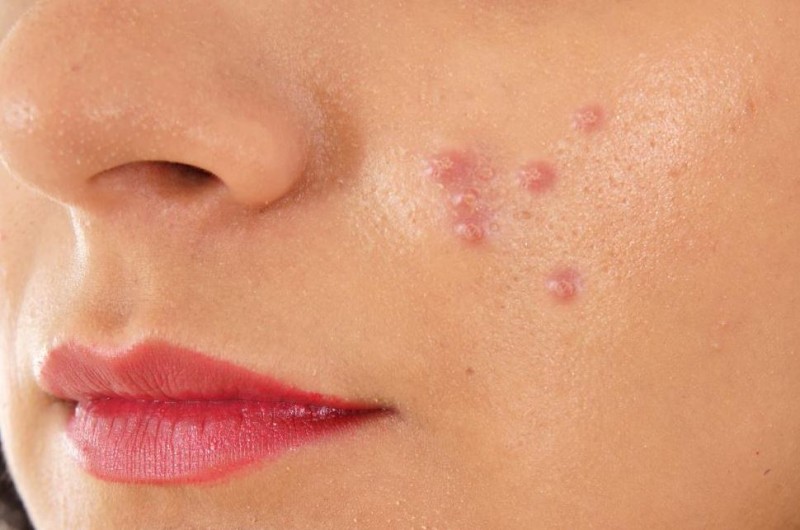
Pimples, also known as acne, are a common skin issue that can make the face look significantly worse. This problem is particularly prevalent among teenagers and young adults due to hormonal changes. However, other factors such as poor diet, lack of skincare hygiene, pollution, and excessively oily skin can also contribute to the development of pimples. If not addressed promptly, pimples can leave behind marks or scars, leading to long-term skin issues.
Understanding the Causes of Pimples
Hormonal Changes
During puberty, the body undergoes significant hormonal changes that can increase oil production in the skin, leading to pimples. This is why teenagers often experience more acne compared to other age groups. However, adults can also suffer from hormonal acne due to menstrual cycles, pregnancy, or conditions like polycystic ovary syndrome (PCOS).
Poor Diet
A diet high in sugary, oily, and processed foods can exacerbate acne. Foods with a high glycemic index can spike blood sugar levels, leading to increased oil production and inflammation. Additionally, dairy products have been linked to acne due to hormones present in milk.
Lack of Skincare Hygiene
Not maintaining a proper skincare routine can lead to clogged pores, resulting in pimples. It is essential to cleanse the face twice daily to remove dirt, oil, and makeup. Exfoliating regularly can also help remove dead skin cells that can clog pores.
Pollution
Exposure to pollution can lead to the accumulation of dirt and toxins on the skin, which can clog pores and cause pimples. People living in urban areas with high pollution levels are more prone to acne.
Excessively Oily Skin
Individuals with naturally oily skin are more likely to develop pimples. The excess oil can mix with dead skin cells and clog pores, leading to inflammation and acne.
Addressing Underlying Health Issues
Digestive Issues
If your stomach is not functioning properly, and you suffer from constipation regularly, toxins can build up in the body, affecting not only your health but also your skin. Poor digestion can lead to the development of pimples. It is crucial to maintain a healthy digestive system by consuming a balanced diet rich in fiber, drinking plenty of water, and avoiding foods that can cause constipation.
Increased Body Heat
Pimples on the face or mouth ulcers can be caused by increased body heat, especially prevalent during the summer months. Factors behind this may include inadequate water intake, consumption of excessively spicy and fried foods, and infections. To cool the stomach, incorporate low-fat yogurt, fennel, and mint into your diet. These foods have a cooling effect on the body and can help reduce internal heat.
Preventive Measures
Limit the Consumption of Certain Foods
If you constantly experience pimples, it's advisable to avoid consuming oily and spicy foods. Junk foods should be strictly limited as they can be harmful to both your health and skin. Drink an adequate amount of water to keep the skin hydrated and flush out toxins. Additionally, reducing sugar intake can help manage blood sugar levels and prevent acne flare-ups.
Maintain a Proper Skincare Routine
Adopting a consistent skincare routine is essential for preventing and managing acne. Cleanse your face twice daily with a gentle cleanser suitable for your skin type. Exfoliate regularly to remove dead skin cells and prevent clogged pores. Use non-comedogenic skincare products to avoid further clogging of pores. Incorporate products containing salicylic acid or benzoyl peroxide, which are effective in treating acne.
Seeking Professional Help
Consult a Doctor
Even after being cautious about your diet and skincare routine, if pimples persist, it's crucial to consult a dermatologist. Persistent acne can be a sign of underlying health issues such as hormonal imbalances or other medical conditions that require professional intervention. A dermatologist can provide personalized treatment options, including topical or oral medications, and advanced therapies like chemical peels or laser treatments.
While skincare products and DIY remedies can help manage pimples to some extent, addressing underlying health issues, particularly related to digestion and hormonal balance, is essential for long-term relief. By understanding the causes of pimples and adopting preventive measures, you can achieve clearer, healthier skin.
No Tobacco Day 2024: Beware of Long-Term Effects of Smoking
No Matter How Hungry You Are, Do Not Eat THESE Foods
THESE 10 Things To Do Before You Sleep for a Healthy Lifestyle